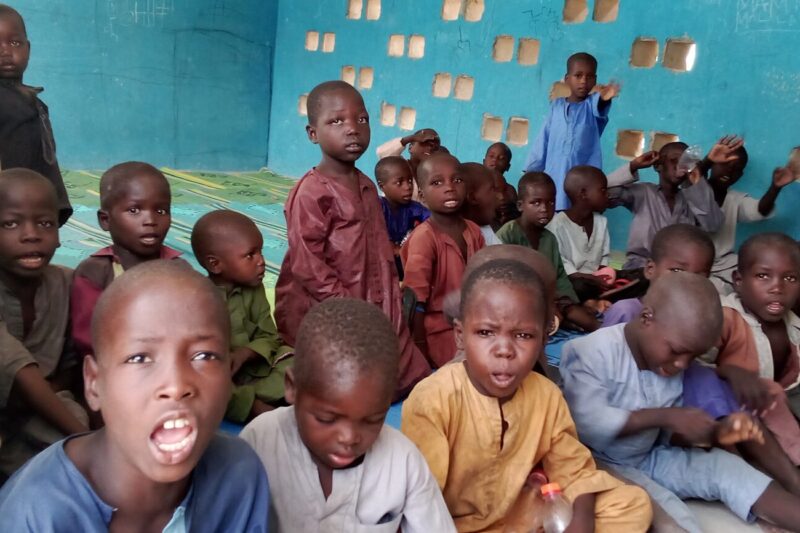Repentant insurgents say despite undergoing skills training, without capital or starter kits they are unable to start a business or earn a living and cannot put what they learned into practice.
They might be disarmed, demobilised, reintegrated and reconciled … but “repentant” insurgents – former fighters who have surrendered to the Nigerian military – are struggling to make a living and settle into everyday life.
Having gone through the government’s deradicalisation and rehabilitation programme, which includes skills acquisition training, the former combatants say they do not have “starter kits” – the necessary tools and equipment – or enough money to grow their skills and put what they have learned into practice.
As part of its Disarmament, Demobilisation, Reintegration and Reconciliation (DDRR) programme, the Borno State government has sought to rehabilitate former fighters of the Jamā’at Ahl as-Sunnah lid-Da’way Wa’l-Jihād (JAS), more commonly referred to as Boko Haram, and its offshoot, the Islamic State West Africa Province (ISWAP), and to return them into society.
While undergoing the programme, the former combatants are kept in protective camps, such as the Hajj in Maiduguri, where, apart from the deradicalisation process, they are taught skills to survive once they are reintegrated into their communities.
The idea is to enable them to find employment, start their own small businesses, put their skills acquisition training into practice and become self-reliant.
The Borno State government says more than 20,000 repentant insurgents have been successfully rehabilitated and reintegrated already. And there are about 100,000 penitent insurgents undergoing the deradicalisation process in protective camps across the state.
It is important for the Borno State government – and in particular, governor Babagana Umara Zulum – for the deradicalisation programme to work. It has taken time and much persuasion for ordinary citizens of the state to endorse having the very people who murdered their loved ones and plundered their lives during the insurgency living side by side with them again.
One community leader told RNI: “It is extremely difficult for ordinary citizens to accept former fighters back into their communities. Many people do not trust them and do not believe they have truly repented.”
Some “repentant” insurgents have rejoined fighters in the bush. Others have been arrested for committing crimes after being reintegrated into society. Still others have held protests, claiming they have not been given the support promised by the government.
Many say that without a starter kit or capital, they are unable to put their skills training into practice and cannot start their own businesses or find work.
Abubakar Ma’aji is a former combatant now living in Maiduguri, the capital of Borno State.
“I was among 500 repentant insurgents who underwent a series of rehabilitation processes, including skills acquisition training.
“I was an active insurgent, fighting in the bush before I surrendered and laid down my gun to the government and the military. We were kept in a protective camp in Maiduguri, where we received various skills acquisition training as part of rehabilitation process.
“The skills acquisition training covers various trades, such as tailoring, carpentry, mechanics and welding, among others. I learnt carpentry skills in the rehabilitation centre. Now I am back in my community but I do not have the equipment or tools I need to practise what I learned.
“About 500 of us were successfully rehabilitated and reintegrated into society about two years ago but up until now we still have not been given a starter kit to help us start a business of our own. Each of us received ₦50,000, which is not nearly enough to start and maintain a business.”
Mustapha Abubakar also underwent the deradicalisation programme and returned to normal civilian life about two years ago.
“Although I underwent skills training, it is not really a priority for me. I am not interested in carpentry or welding. I want to start my own business selling foodstuff. My wish is to sell food from a stall, market, store or canteen. But to do that, I need capital.
“Many rehabilitated and reintegrated insurgents have no capital to start a business. Besides, we did not receive starter kits to enable us to practise the skills we learned, even if we want to work in that field.
“What we really need is cash. That is the only way we will be able to start a business, become self-employed and self-reliant.”
Usman Tar, Borno State commissioner of information and internal security, told RNI that the government was doing its best to ensure rehabilitated and reintegrated insurgents received training to enable them to start businesses and follow their dreams of becoming entrepreneurs.
“Initially, once the former combatants finished the deradicalisation process, including skills acquisition training, they were each given a sum of money to enable them to start businesses and get on their feet. They could use the capital as they saw fit. They were free to choose whatever livelihood suited them.
“But in recent times, the government has come to the realisation that often the main obstacle stopping the former insurgents from starting a business is that they do not have the tools of the trade.
“So, about eight months ago, the government started providing starter kits according to whatever skills training the former fighters underwent. The starter kits consist of all the necessary tools and equipment they need to work as tailors, carpenters, builders and welders.
“Currently, there are about 100,000 penitent insurgents who are undergoing deradicalisation at various protective camps and rehabilitation centres across Borno State. Skills acquisition training programmes, as well as the provision of starter packages and capital, are essential to support the former fighters to become self-employed and self-reliant.
“After all, in many cases it was unemployment that was one of the factors that triggered these men to join Boko Haram in the first place. Now we would like them to get employment and to fully integrate into society. It is what Borno State needs. Indeed, what the whole of Nigeria needs.”
SHETTIMA LAWAN MONGUNO








